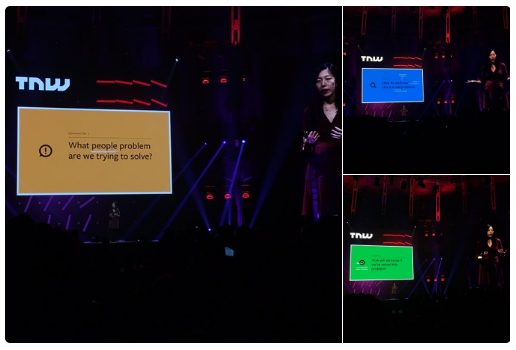Flashing lights. Thousands of attendees. Hundreds of startups. This is The Next Web conference in Amsterdam, and I’m going to give you the main takeaways from this fantastic event. If you have a company, whether it’s a startup or an established business – you must read this post.
While there were hundreds of amazing speakers, including Gary Vaynerchuk, Steve Huffman (Reddit), Julie Zhuo (Facebook), and Jason Fried (basecamp) we wanted to focus down the takeaways into 3 topics that we feel are the most important for every company.
Product Design. Culture. Technology.
Julie Zhuo (@joulee) – VP of Product Design, Facebook
“The 3 questions we always ask at Facebook when start working on a product development”
Julie’s advice was simple (and ironically, the same advice we give to our clients). Design with the user as the most important aspect of your application. Make your application have meaning. Challenge your assumptions. Make sure you’re solving a real problem. She provided 3 questions that I believe every company should ask themselves before creating a product.
- What people problem are we trying to solve?
- How do we know this is a real problem?
- How will we know if we’ve solved this problem?
I absolutely loved her questions and advice; as a company, it matches our values when determining which clients to work with. Remember, the most successful businesses solve a problem. They fit a need and speak to their audience. In the end, business is about the community you serve, and you must care about that community.

Julie Zhuo – 3 Questions TNW Conference
If you want to see her speak, there’s a [decent] quality youtube video here of her presentation. Highly recommended!
Buffer – Keeping true to your Company Culture (Leo, Cofounder Buffer)
Culture is one of the most important aspects of your team. Whether you realize it or not, your every day actions are creating a culture for your company that will affect your entire business. Unfortunately I don’t have a video of Leo’s talk, so I’m going to paraphrase with my memory of his presentation, and my own personal opinions.
- Build your culture intentionally
- Take some time to reflect on what your values as an individual and a company are. Are you reinforcing those values in your workplace? Do your team’s values align with your own? Each of these questions is crucial to determine what your company will be like in the years to come.
- Let transparency and honesty dominate your company culture.
- Buffer inspired us years before we saw Leo speak. They released their company salaries, equity ownership, and provided a formula on how much each person makes. Let them inspire you as well! We are a 100% transparent company, one of the few in the software industry. Much of our courage has come from Buffer’s example – we saw that it is possible, and it is accepted to be honest and open while doing business. Check it out for yourself – See Buffer’s Open Salaries Here; which is the exact document we used to create our own salary structure.
- Let transparency and honesty dominate your company culture. It’s not enough to JUST do it for your team, or JUST do it for your clients. Do it for all aspects of your company. I can guarantee your morale, happiness, and quality of your clients will increase.
- Act on your Values
- Meet with your team to establish your values, and then make them a pre-requisite for every business decision. Does a client not fit your values? Don’t take them. Does a product not seem aligned? Don’t build it. It’s so easy to temporarily “forget” your values when money is at the table. Stay strong and be better for it.
- If a team member doesn’t share your values – ask yourself and them, why? If values are not aligned, is it a good match?
Joshua Hoffman (Technical Founder, Tumblr and Soundcloud)
Do you know how much traffic your site/app can handle? How do you set up for scale? Joshua Hoffman had an amazing presentation on his experiences going from 0 users to a million. The first half of the video is business friendly, the second half is for your developers/dev team. I really recommend watching the video; however, if you must skip ahead here are the main points:
- You must plan for scaling your # of users. If you are about to do a publicity stunt, you MUST coordinate it with your engineering team. You don’t want the advertising to work, yet the
- When scaling, most companies fall into two categories
- Early-Growth Phase – You’re a startup, and you can do anything you want quickly
- Popularity Phase – You now have 100,000 users depending on your service, and you can’t change on a whim. You must scale your architecture and your process
- Look for the scale Horizon
- Plan on your software lasting 1-2 years. It’s impossible (and bad practice) to attempt to make your software last forever. Change is good!
- Be Pragmatic
- Look for the pragmatic solution, do not look for perfection. Perfection is the enemy of the good.
- Instrument Everything
- Where is your health dashboard for your application? How can you look at a single place and know your site is up in a healthy way, or where your errors are?
- Standardize Your Platform
- When you grow large, you create an ecosystem. Other applications (even inside your organization) will use your software components. Make everything a standard to reduce redundancy and errors!
- Install Circuit Breakers
- Just like an electrical circuit breaker – if your app is being hit with too many requests, disable those requests temporarily to allow your system time to recover.
- Create a “Sorry” service
- Bugs and breaks happen for every application. Let the user know why, and show them you’re working on it.
That’s it folks! There are a thousand things and more that you will learn during your startup journey, and we at the Webjunto team wish you all the best. Remember to listen and learn from others who have gone through the same process. You are not alone!
Best Regards,
~Jedi
@jedihacks








Amazing!! Sounds like it was an incredible experience.